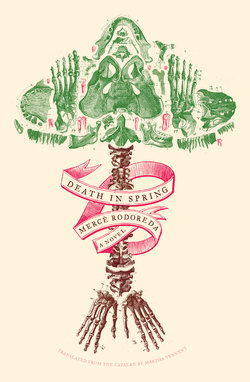Читать книгу Death in Spring - Mercè Rodoreda - Страница 7
На сайте Литреса книга снята с продажи.
ОглавлениеI
I removed my clothes and dropped them at the foot of the hackberry tree, beside the madman’s rock. Before entering the river, I stopped to observe the color left behind by the sky. The sun-dappled light was different now that spring had arrived, reborn after living beneath the earth and within branches. I lowered myself gently into the water, hardly daring to breathe, always with the fear that, as I entered the water world, the air—finally rid of my nuisance—would begin to rage and be transformed into furious wind, like the winter wind that nearly carried away houses, trees, and people. I had sought the broadest part of the river, a place farthest from the village, a place where no one ever came. I didn’t want to be seen. With the mass of water descending from the mountains, snow and streams escaping the shadows through cleft rocks, the river flowed, confident of itself. All the waters joined together in the delirium of joining and flowed endlessly, land on both sides. As soon as I had passed the stables and the horse enclosure, I realized I was being followed by a bee, as well as by the stench of manure and the honey scent of blooming wisteria. The water was cold as I cut through it with my arms and kicked it with my feet; I stopped from time to time to drink some. The sun, filled with the desire to soar, was rising on the other side of Pedres Altes, streaking the white winter water. To trick the bee that was following me, I ducked under the water so it would lose me and not know what to do. I was familiar with the obstinate, seven-year-old bees that possessed a sense of understanding. The water was turbid, like a glass cloud that reminded me of the glass balls in the courtyards beneath the strong wisteria vines, the wisteria that over the years upwrenched houses.
The houses in the village were all rose-colored. We painted them every spring and maybe for that reason the light was different. It captured the pink from the houses, the same way it took on the color of leaves and sun by the river. Shut inside in winter, we made horsetail paintbrushes with handles of wood and wire, and when we had finished them, we stored them in the shed in the Plaça and waited for good weather. Then all of us, men and boys, would set out for the cave on Maraldina in search of the red powder we needed for pink paint. The mountain was covered with heather and crowned by the dead tree, and the wind whistled through the brush. We climbed down to the cave along a knotted rope that had been fastened to a stake. The man who led the way carried a lamp. We lowered ourselves into the damp, black well; it was streaked with veins that would glisten in the sun, then slowly extinguish as we moved deeper and darkness fell, swallowing everything. Through the well we entered the cave, which was like the mouth of the infirm: red and damp. We filled our sacks with powder, tied them tight, and the men who stayed above hoisted them up and stacked them, one on top of the other. When we returned to the village, we would mix the crimson powder with water to make the pink paint that winter would erase. In spring—the blossoming, blooming wisteria draping the houses, bees buzzing—we painted. And suddenly the light was different.
We would leave in the dead of night with the wind always blowing on Maraldina mountain. The ascent was difficult. We entered the cave through the well and left loaded with sacks, one after the other, like ants. From the slope coming down the mountain, we could see the horses grazing, but they were used only for food. We cooked the horseflesh over a log fire, especially at a funeral Festa. At the slaughterhouse, the blood man was in charge of the others, all of whom were too old to do anything but slaughter horses, and the way the old men killed the animals made the meat taste of nothing, nothing but wood. When we climbed Maraldina, the harrying wind would push us backwards, and when we descended with sacks on our shoulders, the wind pushed us upwards. Whether going up or coming down, the wind beat against us as if it were pressing its huge hands against our chests. The old men explained that the low wind on Maraldina blew through the brush when no one was on the mountain. It carried souls that wandered the mountain with the sole purpose of creating fierce winds whenever we went in search of powder, rendering our work more arduous. The wind was telling us that ours was a senseless job, something that was better left undone. Souls have no mouths, so they spoke to us through the voice of the wind.
We would leave our sacks in the middle of the Plaça, and soon thereafter begin mixing the powder with water and painting everything rose-colored. All of the houses were pink except one: the house that belonged to Senyor. He lived at the top of the small mountain that was cleaved by a cliff and overlooked the village, protecting and menacing. The cliff, topped by Senyor’s house, was covered with ivy that blazed in autumn and died soon after.
